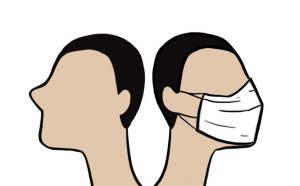Taking minimal precautions
October 17, 2022
Spanish teacher Joyce Fortune believes that COVID-19 should now be treated as an endemic disease, a disease that is always present and even expected in a population. She cites diminishing numbers of cases and CBS’ 60 Minute Interview with President Biden — in which he states “the pandemic is over.”
“COVID-19 is new, but it’s going to be with us forever, but it’s also not a pandemic anymore,” Fortune said. “The pandemic was when we all needed to shelter in place because we had no tools to fight it. We have a lot of tools now. We have very good vaccines [and] good masks readily available.”

Sophomore Ninad Suresh agrees, believing that the low numbers of COVID cases stated in weekly emails from the principal means that “the pandemic is practically over.” He trusts that the COVID vaccines will keep him protected even without additional precautions. Although Ninad notices many students and staff at school are still masking, he says the general population doesn’t see COVID as much of an issue anymore either, as he doesn’t see much masking in other public settings.
While Fortune agrees that there was initially a need for careful precautions, she believes the school collectively needs to move on from its fear of COVID.
“I think it’s a travesty what has been done to the children of the state of California,” Fortune said. “I think that the state kept you in at home way too long [when] you needed to be in the classroom with your teachers and learning. People are social beings. And by cutting off that social part of ourselves, I think we did ourselves a serious disservice. Now that we have [treatments] available, we need to put those into place and move forward and go back to living our lives again.”

Suresh agrees that online learning created a lack of social interaction, saying he “missed seeing [his] friends and being able to interact with them every day.”
For Fortune, interaction is the biggest reason she doesn’t wear a mask.
“[It’s] really important to me to be able to smile at my students,” Fortune said. “It’s really important [for] me to be able to give that connection to them. I’m not going to tell you what to do, but I would love to see you all [with] your masks off.”

















